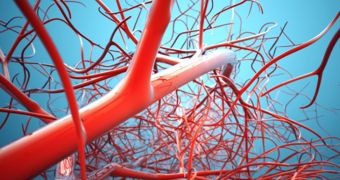A recent paper in the journal Nature documents the discovery of a way to make cancer therapy considerably more effective than it usually is, and thus boost a patient's chances to survive one such diagnosis.
The paper in question is authored by a team of researchers now working with the Barts Cancer Institute in the United Kingdom. Its lead author is Dr. Bernardo Tavora, Medical Express informs.
As part of their investigation into ways to make cancer therapy more effective, these scientists focused on a fairly common molecule known to the scientific community as focal adhesion kinase (FAK, for short).
This molecule can be found in blood vessels that feed tumors and works by signaling the body to repair itself in the aftermath of chemotherapy or radiation therapies, both of which damage not just cancer cells, but also healthy ones.
While looking at samples collected from individuals diagnosed with lymphoma,i.e. a form of blood cell tumors, researchers found that those whose blood vessels packed the lowest levels of FAK were the ones most likely to go into complete remission.
The Barts Cancer Institute specialists therefore concluded that, benefit effects aside, FAK can also negatively affect the outcome of cancer therapy by helping tumors keep themselves safe. Hence, they moved to remove it from blood vessels.
Experiments carried out in laboratory conditions showed that, following the removal of FAK in blood vessels, chemotherapy and radiotherapy therapies were more effective in terms of treating conditions such as melanoma, i.e. skin cancer, and lung cancer.
“This work shows that sensitivity to cancer treatment is related to our own body mistakenly trying to shield the cancer from cell-killing effects caused by radiotherapy and chemotherapy,” Dr. Bernardo Tavora commented on these findings.
“Although taking out FAK from blood vessels won't destroy the cancer by itself, it can remove the barrier cancer uses to protect itself from treatment,” the Barts Cancer Institute specialist and study lead author went on to explain.
Despite the fact that removing FAK from blood vessels can help make cancer therapy more effective has until now only been proven during experiments carried out on mice, the scientists behind this research project hope it will not be long until they can move to clinical trials involving human patients.
“This exciting research may have cracked how healthy cells in the blood vessels are protecting against cancer treatments. This research was only done in mice, but it gives real hope that we can boost the effectiveness of cancer medicine and sensitize cancers to the drugs we have,” said Dr. Kat Arney.

 14 DAY TRIAL //
14 DAY TRIAL //